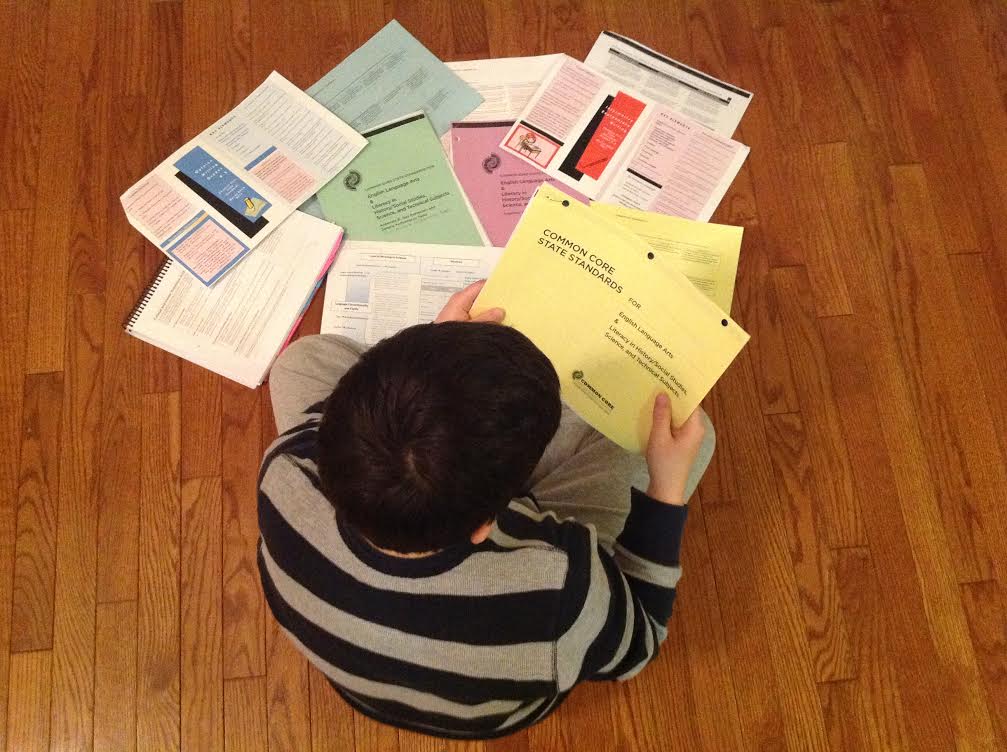
Do you know of any kindergarteners who can “reflexively demonstrate the cogent reasoning and use of evidence that is essential to both private deliberation and responsible citizenship in a democratic republic”? Probably not. Nevertheless, according to its mission statement, the Common Core State Standards Initiative has set out to teach them how to do that and more.
Beginning in 2010, the Common Core has been adopted by 45 states, the District of Columbia, and four territories. The educational program is largely based on testing, and aims to detail what students should know at the end of each grade and prepare them for college and careers. Sounds good, right? Clear expectations. High standards. College readiness. And yet, the real goals of education are being distorted by this standardized, results-driven, program.
The sky-high requirements of the Common Core are not just testing students. Teachers are evaluated and scored based on their students’ test scores, and this includes those received on the Smart Balance tests (Common Core assessments). The pressure being levied on students and teachers is shared by principals, who are also being ranked.
Nervous teachers are spending more and more time on test prep and pre-testing in order to prepare students for the Smart Balance tests; “teaching to the test” is becoming a common practice. According to the Washington Post, Carol Burris, principal of South Side High School in New York, has experienced the fallout from this method first-hand.
“Many of the teachers in my high school are also the parents of young children,” said Burris. “They come into my office with horror stories regarding the incessant pre-testing, testing and test prep that is taking place in their own children’s classrooms.”
Anyone who has taken an ACT prep course knows that drilling for a test pays off — those few extra points could get you into the college of your dreams. However, the course prepares you for the ACT and only the ACT; the skills you need to succeed in the “real world” must be gained through primary and secondary education. The Common Core is putting such pressure on teachers and schools that these stages of learning are becoming one mammoth test prep course, readying students for the Smart Balance tests instead of college and careers.
The Common Core strives, according to its mission statement, to “provide a consistent, clear understanding of what students are expected to learn”, and in pursuing this goal, it holds every student in the nation to the same standard. This sounds good in theory, until the diversity of our country is taken into account. There is no stereotypical student. Children are northern or southern, impoverished or affluent, fast learners or slow learners, disabled or healthy, foreign or American, and outgoing or introverted. If a student performs poorly at school, it may have absolutely nothing to do with the way he or she is being taught — many factors (poverty is especially prominent among them) affect a child’s educational success. Teachers should be allowed leeway in deciding how to educate their unique group and cater to each student’s individual needs, instead of being intimidated into thinking of students as scores instead of people. Students’ minds cannot be standardized.
Ask a group of students what their least favorite part of school is, and they will most likely say tests (homework comes in at a close second). The Common Core has chosen this unsavory aspect of education and installed it as a despot ruling over America’s schools. The program begins in kindergarten, a stage in life during which students acquire either a love or hatred of learning. Whichever emotion is obtained intensifies or lessens depending on a child’s experience in his or her later years of schooling. The Common Core’s incessant testing can’t thrill a kindergartener like a song about the vowels or a coloring sheet, and difficult exams will definitely not make surly teenager leap out of bed in the morning. The key to learning is the desire to learn. If students are not taught at an early age that the purpose of education is not improving test scores, but shaping minds that can shape the world, this desire will never be awakened in them. The Common Core is demolishing the ideas of learning for its own sake and learning for the sake of humanity, the forces that have driven the greatest minds in history.
According to The Daily Caller, Senator Lindsey Graham is expected to introduce a Senate resolution criticizing the Common Core this week, protesting the use of $4.3 billion in Department of Education “Race to the Top” grants to encourage the program’s adoption. But for now, despite its multitude of faults, the Common Core is the educational standard of the majority of the country’s schools. Only Texas, Virginia, Alaska, Minnesota, and Nebraska are holding out against the pressure to adopt it. Who knows? Maybe they’ll see the error of their ways when Common Core-educated 6-year-olds begin to (in the words of the Common Core standards) “delineate and evaluate the argument and specific claims in a text, including the validity of the reasoning as well as the relevance and sufficiency of evidence.”
